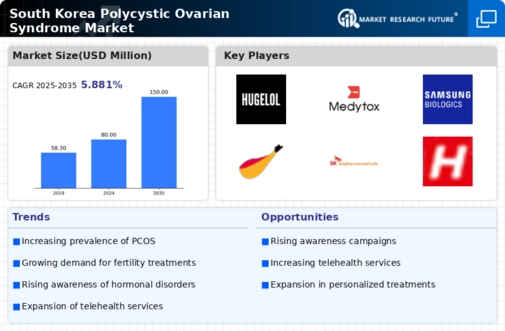Expansion of Pharmaceutical Offerings
The expansion of pharmaceutical offerings specifically targeting polycystic ovarian syndrome is a notable driver for the polycystic ovarian-syndrome market. Pharmaceutical companies are increasingly investing in research and development to create new medications that address the hormonal imbalances associated with PCOS. Recent approvals of novel therapies have broadened the treatment landscape, providing patients with more options. The market for PCOS-related pharmaceuticals is anticipated to grow at a CAGR of around 6% over the next five years, driven by the introduction of innovative treatments. Additionally, the collaboration between pharmaceutical companies and healthcare providers is fostering the development of personalized medicine approaches, which may further enhance treatment efficacy. As these advancements unfold, the polycystic ovarian-syndrome market is poised for significant growth.
Growing Focus on Lifestyle Management
There is an increasing emphasis on lifestyle management as a means to mitigate the symptoms of polycystic ovarian syndrome, which is driving the polycystic ovarian-syndrome market. Healthcare professionals in South Korea are advocating for lifestyle modifications, including dietary changes and exercise regimens, to help manage PCOS symptoms effectively. This shift towards holistic management strategies is likely to enhance patient outcomes and reduce reliance on pharmacological treatments. The market for dietary supplements and wellness programs tailored for PCOS is expected to grow, reflecting the rising consumer interest in preventive healthcare. As more women adopt these lifestyle changes, the polycystic ovarian-syndrome market may witness a transformation, with an increased focus on integrative approaches to treatment.
Rising Demand for Fertility Treatments
The growing demand for fertility treatments among women diagnosed with polycystic ovarian syndrome is a significant driver for the polycystic ovarian-syndrome market. PCOS is a leading cause of infertility, affecting hormonal balance and ovulation. As more women seek assistance in conceiving, the market for fertility-related therapies is expanding. In South Korea, the fertility treatment market is projected to reach approximately $1 billion by 2027, with a substantial portion attributed to PCOS patients. This trend is further supported by increasing societal acceptance of assisted reproductive technologies, such as in vitro fertilization (IVF). Consequently, healthcare providers are focusing on developing specialized fertility treatments tailored to the unique needs of women with PCOS, thereby propelling the growth of the polycystic ovarian-syndrome market.
Advancements in Diagnostic Technologies
Technological advancements in diagnostic tools are significantly influencing the polycystic ovarian-syndrome market. Innovations such as improved imaging techniques and biomarker identification have enhanced the accuracy of PCOS diagnoses. For instance, the introduction of non-invasive methods allows for earlier detection, which is crucial for effective management. The market for diagnostic devices is projected to grow at a CAGR of around 8% over the next few years, reflecting the increasing demand for precise and timely diagnosis. Furthermore, the integration of artificial intelligence in diagnostic processes is expected to streamline patient assessment, thereby improving treatment outcomes. As healthcare providers in South Korea adopt these advanced technologies, the polycystic ovarian-syndrome market is likely to experience substantial growth, driven by the need for efficient diagnostic solutions.
Increasing Incidence of Polycystic Ovarian Syndrome
The rising incidence of polycystic ovarian syndrome (PCOS) in South Korea is a critical driver for the polycystic ovarian-syndrome market. Recent studies indicate that approximately 10-15% of women of reproductive age are affected by this condition, leading to heightened demand for diagnostic and therapeutic solutions. As awareness of PCOS grows, more women are seeking medical advice, which in turn stimulates market growth. The increasing prevalence of obesity and sedentary lifestyles among the population further exacerbates the situation, as these factors are closely linked to the development of PCOS. Consequently, healthcare providers are focusing on developing targeted treatments and management strategies, thereby expanding the polycystic ovarian-syndrome market. This trend is likely to continue, as the healthcare system adapts to meet the needs of a growing patient population.




















Leave a Comment